Why do I need a knowledge base or FAQ site?
Customers like to find answers to their questions without having to reach out to customer support
The Knowledge base software is an application that helps you create, organize, and publish information about your product or service. Your customers will be able to access the information that you publish through a website, where they can find answers for their questions about your product before sending in a support query.
Benefits offered by our Knowlege Base Software
Our FAQ software makes the technical writing process, content management, and discovery a joy
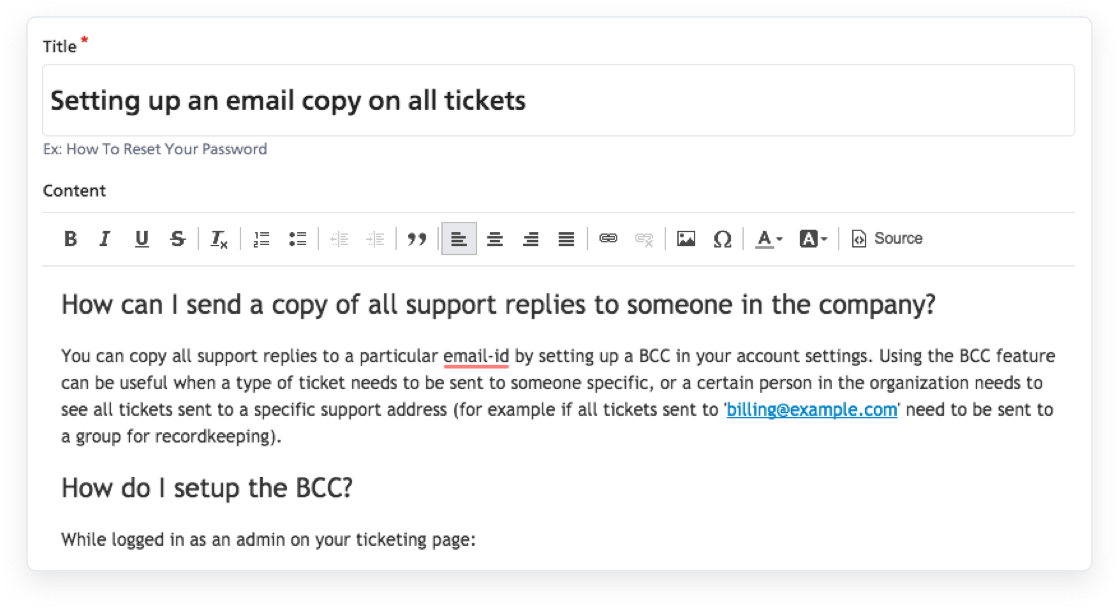
Easily create and edit content
Our rich text editor helps you create neatly formatted content which can be organized into articles under various categories. The ability to add inline images helps in making your text instruction more lucid.
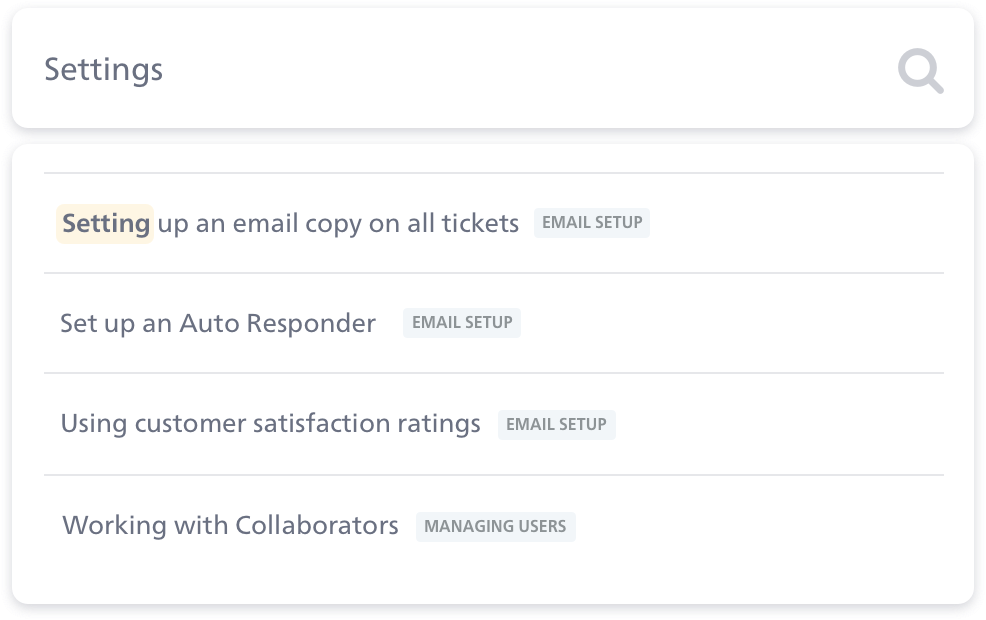
Powerful and fast search
Search is at the heart of content discovery. We power your knowledge base software with a robust search functionality to help your customers find the answers they need without much effort.
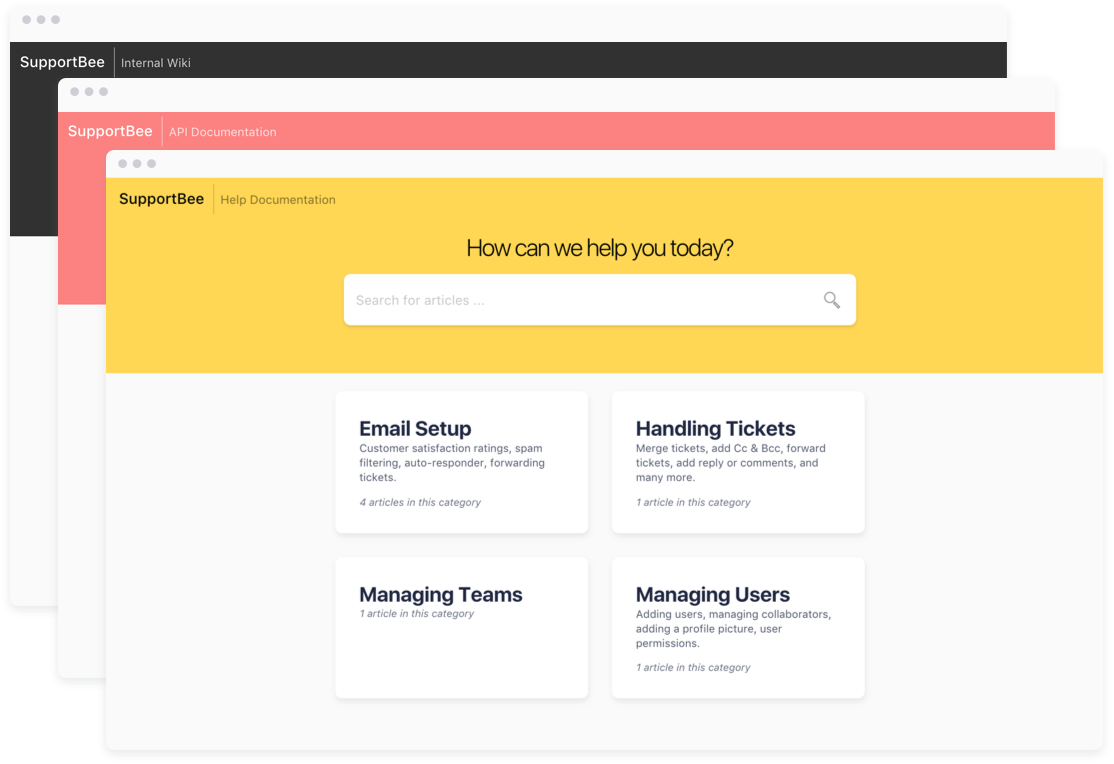
Create multiple knowledge bases
With SupportBee, you can manage documentation for multiple sites with a single account. It can be tiresome and sometimes more expensive to set up a separate account for each of your products. With SupportBee, manage everything - emails and knowledge base - all under a single login.
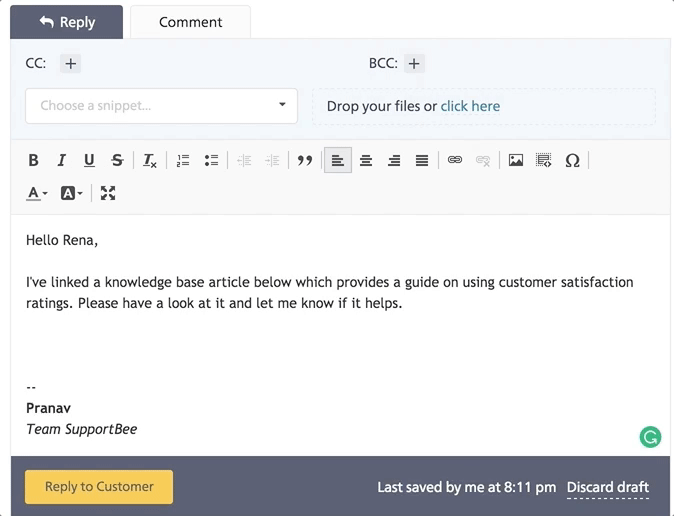
Easily link to knowledge base articles with snippets
The Snippets search bar helps you quickly search and link to knowledge base articles when replying to a customer. SupportBee seamlessly integrates your knowledge base with shared inbox, making life a lot easier for customer support agents.

Upload files - PDFs, Ebooks, and more
With SupportBee, you will have the ability to upload files to your Knowledge base that can be easily accessed by your customers. The files can be anything from images and videos to PDFs or Ebooks. As an example, you can see our Ebook, Dialogues on Customer Service uploaded to our Knowledge base under the section called 'Ebooks'.
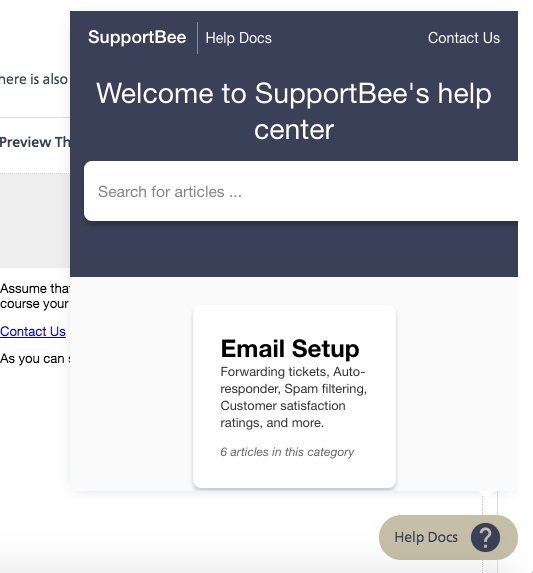
Embed your Knowledge base in your website
Hive is SupportBee's embeddable option for the Knowledge Base site. It enables you to display help articles right in your website or app where help is actually required.
Brand your Knowledge Base or FAQ site
A consistent experience for your customers
Design customizations
You have the option to brand the portal with your logo and colors. This simple customization option helps you deliver a consistent experience for your customers across your website and portal. You can also use a custom domain to make your client portal truly your own.
Your domain name
You can also use a custom domain to make your knowledge base or FAQ site truly your own.
HTTPS for privacy and security
The knowledge base of FAQ is accessible over https to offer your customers complete privacy and security of your data. You can also make private sites, for agent only access, or create a password protected site for customers. We are also GDPR-compliant.
More information about the Knowledge Base Software?
Find answers to the most common questions about our KBee
What is a knowledge base?
A knowledge base is a digital collection of files, documents, and essential product or service information that is stored at a centralized location for an organization. The collection acts as a self-service reference for common problems and tasks. Some examples of content often included in knowledge bases are FAQs, troubleshooting guides, and articles. A well-designed knowledge base will offer easy access to information and resources for all the services and/or products that a company provides.
There are two common deployments of a knowledge base: internal and external. With an internal knowledge base, the information is meant to be accessed by employees of the organization to help them perform their job functions. For example, one environment where an internal knowledge base can be useful is an IT support call center. External knowledge bases are used to provide information directly to customers or other third-party designees. It can be an important tool for improving customer engagement. Regardless of the deployment type, knowledge bases are designed to be collaborative, and the information within should be improved upon over time. As a company grows, it can become an indispensable resource.
Why is a knowledge base important?
Having a knowledge base gives your company the ability to streamline support services for your employees and your customers. Whenever someone encounters a problem or has a question about a product or service, their first resource is likely to be a knowledge base. When one is not available, they are forced to search for the answer elsewhere or could inquire with your support staff, taking valuable time away from other urgent support requests. A knowledge base also offers these important benefits:
They provide easy access to a nearly limitless amount of information. Since you can customize and structure a knowledge base taking into account your specific company needs, it allows visitors to access information quickly. Today, people want to find answers without having to go through too many steps. A robust, easy to use knowledge base makes it possible to find solutions easily with minimal effort.
They are helpful to your service representatives. Given the limited resources of your support team, a knowledge base acts as a self-service extension of your existing phone, email, and live chat support. Your team members can focus their efforts on new and challenging requests, while the knowledge base supports routine and straightforward inquiries. Service reps are also able to access the archive to find answers quickly, which can be an especially valuable resource when onboarding new employees.
How do you build a good knowledge base?
A successful knowledge base deployment results from proper planning, understanding your unique requirements, and having a well-structured rollout. There are several important steps to launching an effective knowledge base, but these are a few of the most vital tasks:
Categorize your articles and media with a logical structure from the very start for easy referencing and search.
Create templates for standard articles to ensure that the tone and language are aligned between documents. Having a cohesive structure among reference articles helps maintain consistency between departments and makes the archive easier to browse.
Develop an editorial and review workflow for your knowledge base articles. Before any information is released onto the platform, you want to ensure that it is accurate and does not include any out-of-date information. Having a simple workflow in place will ensure that this happens and improve the quality of your records.
The best way to optimize your knowledge base design is to work closely with your support staff, department leadership, software support team, and even your customers. A good knowledge base is one that is frequently referenced and continuously updated by those who use it. Considering the needs of your team in your system design will help you create a knowledge base that everyone will value.
Learn More About Knowledge Bases
Explore our documentation and articles to get the most out of your knowledge base
